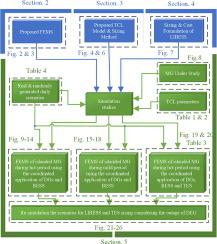Energy and Buildings ( IF 6.6 ) Pub Date : 2021-02-27 , DOI: 10.1016/j.enbuild.2021.110850 Mehrdad Bagheri Sanjareh , Mohammad Hassan Nazari , Gevork B. Gharehpetian , Seyed Hossein Hosseinian

|
This paper proposes an energy management scheme (EMS) for islanded operation of a residential Microgrid (MG) using a Lithium-Ion battery (LIB) energy storage system (LIBESS) and distributed generators (DGs). The LIBESS handles primary frequency control and energy management during peak-load period while the dispatchable DGs supply the base load. During peak-load periods, the thermostatically controlled loads (TCLs) like air conditioners (ACs) make up a significant part of MG demand. A Thermal energy storages (TES) is quite similar to a TCL except that it can also store thermal energy for later use. Here, instead of using the ACs, it is proposed to use a TESS to provide the required thermal energy for keeping the inside temperatures of residences within the desired range. Instead of using the ACs, a pre-charged TES can be used to provide the needed cooling thermal energy during islanded operation that power generation capacity is insufficient. By not using the ACs, the total energy consumption of MG and the required LIB capacity for energy management decreases considerably. Various daily scenarios from available recorded data and randomly generated data are used to consider the uncertainties of the variations of the MG load profile, the ambient temperature and the renewable power generations. Also, the outage of the DG with the largest generation capacity is considered as the worst contingency that could ever happen during the islanded operation of MG. The LIBESS sizing results with and without the outage of the DG show that with the ACs being totally replaced with a TES, the overall cost of the TES and the LIBESS is decreased by 33% and 63% respectively than the case that the TES is not utilized.
中文翻译:

确定孤岛微电网能量管理的热能和电能存储系统大小的新方法
本文提出了一种使用锂离子电池(LIB)储能系统(LIBESS)和分布式发电机(DGs)的住宅微电网(MG)孤岛运行的能源管理方案(EMS)。LIBESS在高峰负载期间处理主要的频率控制和能量管理,而可调度的DG提供基本负载。在高峰负荷期间,诸如空调(AC)之类的恒温控制负荷(TCL)构成了MG需求的重要组成部分。热能储存器(TES)与TCL非常相似,除了它还可以储存热能以供以后使用。在此,代替使用AC,建议使用TESS来提供所需的热能,以将住宅的内部温度保持在期望的范围内。而不是使用AC,预充电的TES可用于在孤岛运行期间提供发电能力不足的所需冷却热能。通过不使用AC,MG的总能耗和能源管理所需的LIB容量将大大降低。来自可用的记录数据和随机生成的数据的各种日常情景被用来考虑MG负载曲线,环境温度和可再生能源发电量变化的不确定性。同样,具有最大发电容量的DG的故障也被认为是MG孤岛运行期间可能发生的最严重的意外事件。在DG中断和未中断的情况下,LIBESS调整大小的结果表明,将AC完全替换为TES后,











































 京公网安备 11010802027423号
京公网安备 11010802027423号